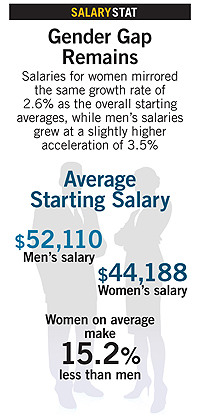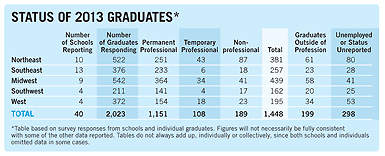Placements & Salaries 2014: The Impact of Region and Demographics
Also in this article:
Using GPS
There is no denying that location is everything in achieving higher than average starting salaries for new LIS grads. For the 2013 graduating class finding jobs in the West, especially in California and Washington State, proved to be lucrative. Once again average salaries in the West ($55,631) outpaced the other regions by an average of 28.7%, though they did not have the same meteoric rise as previous years (2.2% compared to 9.3% in 2012 and 7% in 2011). With the exception of academic libraries, which experienced a 4% decline in average starting salaries, there was a general trend toward higher salaries in all types of libraries and agencies in the West. Salaries for placements outside of the LIS profession had the highest starting average ($71,416 compared to $45,650 overall) and phenomenal growth between 2012 and 2013, rising 40.7% from $50,747. Much of this can be attributed to the type of fields where grads were hired, including defense, aerospace, manufacturing, technology, and finance, and to the types of jobs they do, such as software engineering, data analytics, user experience, and user interface design.
Signs of economic recovery and progress were evident among grads finding positions in the Midwest. While starting salaries ($44,555) continued to be slightly lower than the national average ($45,650), the gap narrowed considerably from nearly 5% ($42,427 compared to $44,503) in 2012 to 2.5% in 2013. Salary levels achieved by those in school libraries ($46,100 up 7.4% compared to 2012) and in other agencies ($53,029 with an increase of $6,719 from 2012) contributed to the healthy growth. Even public libraries in the Midwest experienced a modest rise in salary, moving from an average of $36,762 in 2012 to $38,194 (3.9% increase in 2013).
 Grads landing in the Southeast experienced setbacks, with average starting salaries dropping by nearly 5% to $40,719. These grads saw falling salaries in school libraries ($42,125 down 5.3%); special libraries ($42,798 down 11%), which also saw lower placement rates; and archives ($40,625 compared to $50,750 in 2012). As in other regions the bright spot was outside of libraries, which saw average starting salaries climbing to $52,724 (an increase of 11.5% over 2012 levels of $47,307). While Southeast public library salaries were flat in 2013 ($36,525 compared to $36,759 in 2012), men found salaries 22.3% higher than the previous year ($37,732 compared to $30,850).
Grads landing in the Southeast experienced setbacks, with average starting salaries dropping by nearly 5% to $40,719. These grads saw falling salaries in school libraries ($42,125 down 5.3%); special libraries ($42,798 down 11%), which also saw lower placement rates; and archives ($40,625 compared to $50,750 in 2012). As in other regions the bright spot was outside of libraries, which saw average starting salaries climbing to $52,724 (an increase of 11.5% over 2012 levels of $47,307). While Southeast public library salaries were flat in 2013 ($36,525 compared to $36,759 in 2012), men found salaries 22.3% higher than the previous year ($37,732 compared to $30,850).
While starting salaries for jobs in the Southwest were higher than the previous year at $42,213, the increase (up 1.2%) did not quite recover the losses of 2012 (down 1.9%). Once again academic librarians reported some of the most significant salary losses in the Southwest, dropping nearly 14% from $41,720 in 2012 to $35,988 in 2013. However, there were surprises in the overall salary growth for public librarians, which increased 8.7% ($38,552 compared to 2012 levels of $35,457), and among women (up 15% to $38,430) and grads reporting minority status (up 16.3% to $47,001).
Reported earnings in the Northeast remained relatively flat with a 1.5% uptick, moving from $45,077 in 2012 to $45,742 in 2013, a slim $665 increase. Archivists in the Northeast achieved the best overall salary growth. Their average starting salaries grew by 16.1% from $36,827 to $42,743. Salaries for other agencies grew at a much slower pace, rising 5.6% compared to an 18.6% average growth overall (from $48,124 to $50,799). One positive outlook for the Northeast was the above average starting salary for men taking on jobs in academic libraries. Not only did they experience a 7% year-over-year increase ($49,213 compared to $46,000), but they also achieved salaries 7.8% higher than the overall rate of $45,650.
Salary growth for the 2013 graduating class, while not soaring, made a positive move of 2.6% from $44,503 in 2012 to $45,650, finally breaking through the $45,000 barrier. Salaries for women ($44,188) mirrored the same growth rate of 2.6% as the overall starting averages, while men’s salaries ($52,110) grew at a slightly higher acceleration of 3.5%. In a bit of a surprise, women accepting jobs in the West experienced flat salary growth between 2012 ($51,871) and 2013 ($51,896), while men in the same region had a growth spurt of 10.6% (from $60,211 to $66,569). The healthiest salary changes for women came in the Midwest, with an average increase of 4.6% and an average starting salary of $43,125 (compared to $41,228 in 2012). By comparison, women and men in the Southeast suffered setbacks, with women ($38,989) losing 3.6% in salary compared to an eye-popping 11.2% decrease for men ($43,695).
The highest average salaries achieved by women were in other agencies, starting at $51,827, with the best wages obtained in private industry (averaging $48,699). Women also achieved better than average salaries in school libraries ($47,403), approximately 3.8% higher than the overall ($45,650), and 7.3% higher than the overall average for women ($44,188). Men also followed suit in other agencies, with an average starting salary of $68,973, coming in at 32.4% higher than average salaries reported by all men ($52,110).
Minority status more closely matched the other salary and placement trends identified for 2013 than it has for some time. In previous reports graduates self-identifying as members of minority groups earned higher average salaries (as much as 15.9% higher in 2012) than all of their counterparts. In 2013, this trend reversed when minority grads reported salaries 2.6% less than the overall average ($44,473 compared to $45,650). One of the most notable changes occurred in the Southeast. In 2012 reported salaries among minority graduates increased slightly more than 26% to $57,042; in 2013 all those gains were given up in a swift decline of 28% to $44,579. Salaries for minority graduates in the Midwest followed the same pattern as other graduates in the region, gaining 4.7% in average starting wages between 2012 ($49,926) and 2013 ($52,250).
For graduates claiming minority status, type of agency offered the greatest impact on salary. While overall salaries by type of agency were up, minority graduates experienced drops in most types. Public libraries, for example, exhibited a 4% increase in salaries ($39,559 compared to $38,029) for all reporting graduates; minority graduates in the same agencies saw a 6.2% decrease year to year ($38,047 in 2013 compared to $40,561 in 2012). Academic library salaries remained flat in 2013 but dropped from $48,174 in 2012 to $43,872 for minority placements (an 8.9% loss).
Women self-identifying as minority graduates, while continuing to earn more than all women (7.2% higher), lost some of the momentum of previous years with a cut of $3,942 (7.6%) in starting salary to $47,612. Men, on the other hand, saw a positive change in circumstances, with those self-identified as members of a minority group earning 7% more than the previous year’s reports ($61,513 compared to $57,504). This also reversed the losses between 2011 and 2012 when minority men dropped $3,978 from their salaries.
The greatest improvements in salaries for minority grads occurred in school library positions ($53,857 compared to $46,867), which grew by nearly 15%, and for placements in special libraries ($46,167 compared to $42,823), up by 7.8%. Interestingly, the number of minority placements in both types of agencies was down slightly from 2012 placements.
RELATED
ALREADY A SUBSCRIBER? LOG IN
We are currently offering this content for free. Sign up now to activate your personal profile, where you can save articles for future viewing












Add Comment :-
Comment Policy: